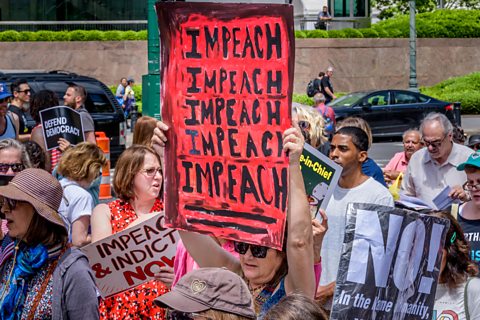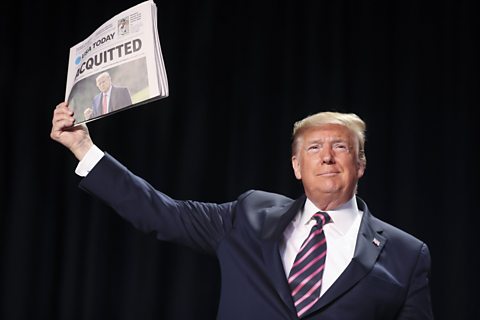Limits on presidential power
There are limits to US presidential powers.
Impeachment
One limit on presidential power is impeachment. This is a way for Congress to put a President on trial for abuse of power and, ultimately, remove them from office.

Impeachment involves several steps. The initial stage, the power to investigate alleged wrong-doing on the part of the President, belongs to the lower house of the US Congress тАУ the House of Representatives.
By a simple majority, the House of Representatives can vote to proceed with the impeachment process.
The next stage passes on to the Senate where the President is placed on trial. The members of the Senate vote on whether to convict the president. Unlike in the House of Representatives, a тАШsuper-majorityтАЩ of two-thirds of the vote is required to convict.
The impeachment of President Trump, 2019

The Democrats allege that during a phone conversation in July 2019, President Trump illegally urged President Zelensky of Ukraine to investigate Joe Biden, a potential Democrat rival for the up-coming 2020 US presidential elections. Trump is accused of threatening to withhold military aid to Ukraine if Zelensky did not announce the investigation.
If true, the charges would be an abuse of presidential power and of using the presidency for personal gain to the detriment of national security. Trump denies any wrong-doing.
On 19 December 2019, the House of Representatives voted to impeach the President Donald Trump. They voted on two charges:
- abuse of power тАУ the attempt to get the Ukrainian President to investigate Biden
- obstruction of Congress тАУ the allegation that Trump withheld evidence and barred his key aides from giving evidence
Impeachment verdict

On 5 February 2020, President Trump was acquitted of both charges by the Republican-controlled Senate.
On the first charge тАУ abuse of power тАУ the vote was 52-48 in TrumpтАЩs favour. The only Republican senator to vote against Trump was Mitt Romney.
On the second charge тАУ obstruction of Congress тАУ the vote was 53тАУ47 in favour of Trump. All 53 Republican senators backed Trump.
Trump joins just three other Presidents to have faced impeachment: Bill Clinton in 1999; Richard Nixon in 1974; and Andrew Johnson in 1868.
None of the impeachment proceedings were successful. Clinton and Johnson avoided a super-majority verdict against them and Nixon resigned before he could be impeached.
Donald Trump: second impeachment trial
A second impeachment process was started against Trump in early 2021. This was the first time in US history that a President had faced a second impeachment trial and the first time a President had been accused after they had left office (Trump departed 20 Jan. тАЩ21; trial in Senate was in Feb тАШ21).
This time Trump was accused of тАЬinciting an insurrectionтАЭ i.e. encouraging his supporters to attack and overthrow the US Congress. However, after a short, five day trial, there was not enough support within the Senate to convict Trump (57 guilty to 43 not guilty) as a two-thirds majority is required for a presidential impeachment conviction.
Notably, a few Republicans did vote to find Trump guilty this time around but most Republicans sided with Trump because either they questioned whether the Senate should be impeaching Trump as he was by then a former President or they were worried that TrumpтАЩs continued strong support within the Republican Party would cause them difficulties when it came to their re-election in future.
President Biden and impeachment
Recently, it could be argued, Republican and Democrat politicians use the impeachment process to discredit their political opponents.
In September 2023, impeachment proceedings were started against President Biden. He is accused of various charges which relate to bribery and corruption although no evidence has been presented, yet, to uphold these allegations. BidenтАЩs son, Hunter Biden, is also accused separately, of a range of criminal charges.
A House of Representatives committee is investigating and gathering evidence, including questioning Hunter Biden, in respect of the accusations against President Biden.